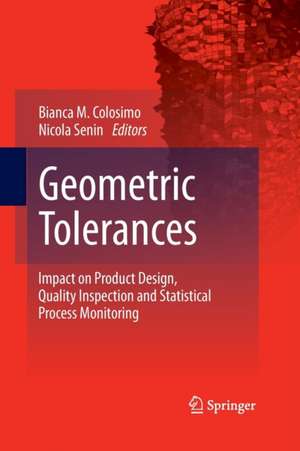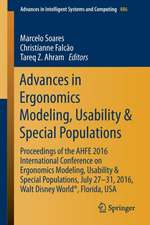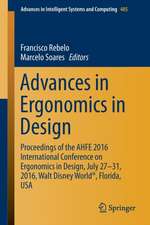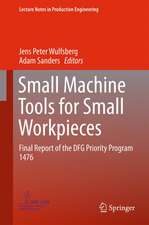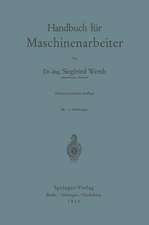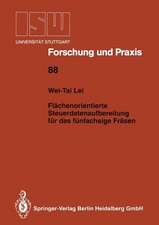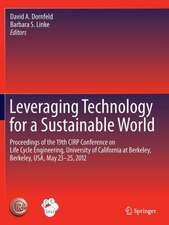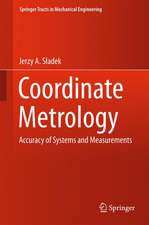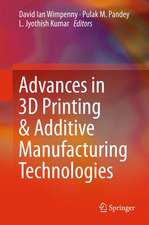Geometric Tolerances: Impact on Product Design, Quality Inspection and Statistical Process Monitoring
Editat de Bianca M. Colosimo, Nicola Seninen Limba Engleză Paperback – 23 aug 2016
| Toate formatele și edițiile | Preț | Express |
|---|---|---|
| Paperback (1) | 1383.00 lei 6-8 săpt. | |
| SPRINGER LONDON – 23 aug 2016 | 1383.00 lei 6-8 săpt. | |
| Hardback (1) | 1387.73 lei 6-8 săpt. | |
| SPRINGER LONDON – 8 oct 2010 | 1387.73 lei 6-8 săpt. |
Preț: 1383.00 lei
Preț vechi: 1686.58 lei
-18% Nou
Puncte Express: 2075
Preț estimativ în valută:
264.65€ • 278.28$ • 218.67£
264.65€ • 278.28$ • 218.67£
Carte tipărită la comandă
Livrare economică 17 aprilie-01 mai
Preluare comenzi: 021 569.72.76
Specificații
ISBN-13: 9781447168911
ISBN-10: 1447168917
Pagini: 356
Ilustrații: XVIII, 336 p.
Dimensiuni: 155 x 235 x 19 mm
Greutate: 0.5 kg
Ediția:Softcover reprint of the original 1st ed. 2011
Editura: SPRINGER LONDON
Colecția Springer
Locul publicării:London, United Kingdom
ISBN-10: 1447168917
Pagini: 356
Ilustrații: XVIII, 336 p.
Dimensiuni: 155 x 235 x 19 mm
Greutate: 0.5 kg
Ediția:Softcover reprint of the original 1st ed. 2011
Editura: SPRINGER LONDON
Colecția Springer
Locul publicării:London, United Kingdom
Cuprins
1. Geometric Tolerance Specification.- 2. Geometric Tolerance Analysis.- 3. Quality Inspection of Microtopographic Surface Features with Profilometers and Microscopes.- 4. CMM Measurement Planning.- 5. Identification of Microtopographic Surface Features and Form Error Assessment.- 6. Geometrical Tolerance Evaluation Using Combined Vision-Contact Techniques and Other Data Fusion Approaches.- 7. Statistical Shape Analysis of Manufacturing Data.- 8. Statistical Quality Monitoring of Geometric Tolerances: the Industrial Practice.- 9. Model-based Approaches for Quality Monitoring of Geometric Tolerances.- 10. A Model-Free Approach for Quality Monitoring of Geometric Tolerances.- 11. Quality Monitoring of Geometric Tolerances: a Comparison Study.
Notă biografică
Bianca M. Colosimo is an associate professor in the Department of Mechanical Engineering at the Politecnico di Milano, Milan, Italy, where she received both her M.S. degree in Industrial Engineering and her PhD degree in Manufacturing and Production Systems. Since 2001, she has collaborated with the Engineering Statistics Laboratory of the Industrial Engineering Department of the Pennsylvania State University. She is a member of the editorial board of the Journal of Quality Technology. She is the author of about 60 papers in international and national journals and conference proceedings, including over 20 refereed papers (in the Journal of Quality Technology, Technometrics, Communications in Statistics and Journal of Applied Statistics, among others). She is a senior member of the American Society for Quality (www.asq.org), a member of Informs (http://www.informs.org/) and of the AITEM (Italian association of manufacturing engineers (www.aitem.org)).
Her research interests are mainly in the area of quality monitoring and process adjustment, with special attention to discrete part manufacturing. Further research activity is devoted to manufacturing process optimization. Her main research target is to take full advantage of new methods and tools developed in the area of applied or industrial statistics for solving industrial manufacturing problems.
Nicola Senin is an associate professor in the Department of Industrial Engineering at the University of Perugia, Perugia, Italy, where he received his M.S degree in Mechanical Engineering. Since 1995 he has collaborated with the Computer-aided Design Laboratory at the Massachusetts Institute of Technology (MIT), in Cambridge (MA), USA. He is the author of about 30 publications in international and national journals and conference proceedings, including about 10 refereed papers in international journals (in the ASME Journal of Mechanical Design, the Computer Aided Design Journal, the Journalof Robotics and Computer-integrated Manufacturing, and Wear, among others). He is a member of the AITEM (Italian association of manufacturing engineers (www.aitem.org)).
His research interests are mainly in the area of inspection of manufactured surfaces, with particular reference to three-dimensional surface topography analysis at the micro and sub-micro scales. Additional research activities are related to the development of computer-based frameworks for supporting collaborative product design and manufacturing.
Her research interests are mainly in the area of quality monitoring and process adjustment, with special attention to discrete part manufacturing. Further research activity is devoted to manufacturing process optimization. Her main research target is to take full advantage of new methods and tools developed in the area of applied or industrial statistics for solving industrial manufacturing problems.
Nicola Senin is an associate professor in the Department of Industrial Engineering at the University of Perugia, Perugia, Italy, where he received his M.S degree in Mechanical Engineering. Since 1995 he has collaborated with the Computer-aided Design Laboratory at the Massachusetts Institute of Technology (MIT), in Cambridge (MA), USA. He is the author of about 30 publications in international and national journals and conference proceedings, including about 10 refereed papers in international journals (in the ASME Journal of Mechanical Design, the Computer Aided Design Journal, the Journalof Robotics and Computer-integrated Manufacturing, and Wear, among others). He is a member of the AITEM (Italian association of manufacturing engineers (www.aitem.org)).
His research interests are mainly in the area of inspection of manufactured surfaces, with particular reference to three-dimensional surface topography analysis at the micro and sub-micro scales. Additional research activities are related to the development of computer-based frameworks for supporting collaborative product design and manufacturing.
Textul de pe ultima copertă
Geometric tolerances are changing the way we design and manufacture industrial products. Geometric Tolerances covers their impact on the world of design and production, highlighting new perspectives, possibilities, current issues and future challenges.
The topics covered are designed to be relevant to readers from a variety of backgrounds, ranging from product designers and manufacturers to quality inspection engineers and quality engineers involved in statistical process monitoring. Areas included are:
The topics covered are designed to be relevant to readers from a variety of backgrounds, ranging from product designers and manufacturers to quality inspection engineers and quality engineers involved in statistical process monitoring. Areas included are:
- selection of appropriate geometric tolerances and how they stack up in assembled products;
- inspection of parts subjected to geometric tolerancing from the macro to the micro and sub-micro scales; and
- enhancement of efficiency and efficacy of quality monitoring.
Caracteristici
Provides new perspectives on the development of a current evolution in industrial manufacturing Features up-to-date research and information to give quality engineers, designers and manufacturing process managers a competitive advantage Gives a modern approach Includes supplementary material: sn.pub/extras
